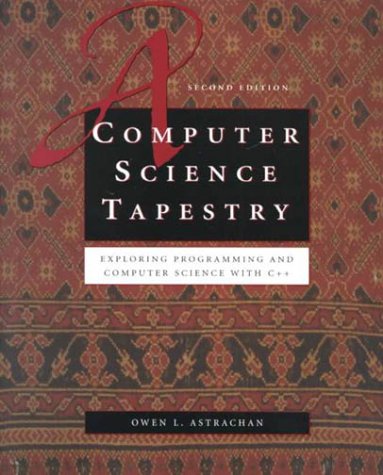
A Computer Science Tapestry: Exploring Computer Science with C++
by Owen L. Astrachan
Publisher: McGraw - Hill 1999
ISBN/ASIN: 0072322039
ISBN-13: 9780072322033
Number of pages: 879
Description:
This book is designed for a first course in computer science that uses C++ as the language by which programming is studied. The goal has not been to cover the syntax of a large language like C++, but to leverage the best features of the language using sound practices of programming and pedagogy in the study of computer science and software design.
Download or read it online for free here:
Download link
(4.4MB, PDF)
Similar books
 A Machine Made this Book: Ten Sketches of Computer Science
A Machine Made this Book: Ten Sketches of Computer Scienceby John Whitington - Coherent Press
Using examples from the publishing industry, Whitington introduces the fascinating discipline of Computer Science to the uninitiated. Chapters: Putting Marks on Paper; Letter Forms; Storing Words; Looking and Finding; Typing it In; Saving Space; etc.
(7088 views)
 Computer Science from the Bottom Up
Computer Science from the Bottom Upby Ian Wienand - bottomupcs.com
Computer Science from the Bottom Up: a free, online book designed to teach computer science from the bottom end up. Topics covered include binary and binary logic, operating systems internals, toolchain fundamentals and system library fundamentals.
(16496 views)
 CS for All
CS for Allby Christine Alvarado, et al. - Harvey Mudd College
Our objective is to provide an introduction to computer science as an intellectually vibrant field rather than focusing exclusively on computer programming. We emphasize concepts and problem-solving over syntax and programming language features.
(12139 views)
 Introduction to Soft Computing
Introduction to Soft Computingby Eva Volna - Bookboon
This book gives an introduction to Soft Computing, which aims to exploit tolerance for imprecision, uncertainty, approximate reasoning, and partial truth in order to achieve close resemblance with human like decision making.
(9304 views)